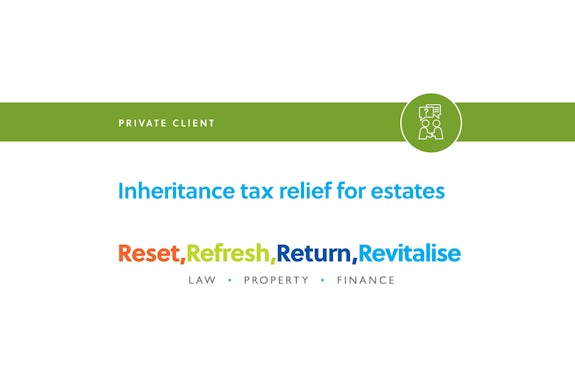By Gilson Gray
March 5, 2021

We have highlighted previously how Coronavirus has had an impact on many things in relation to the administration of a deceased’s estate. With our advice clients are adapting how they do things and, due to the current unpredictability of the situation the world finds itself in, we are constantly reviewing ways in which we can help progress matters for our clients during this time.
We are seeing a rise in the number of estates where asset values have fallen dramatically since date of death, mainly due to the unpredictability of stock markets. Because of this, it is important that executors are aware that, where inheritance tax was paid based on at the date of death value and that value has fallen it is possible to claim some relief.
By way of example:
Ms A’s estate at date of death included:-
After the allowances which the estate was able to claim, inheritance tax of £60,000 was due and paid six months after deat.
However, the property sold on the open market for £340,000. As such a sale was within 4 years of death, the sale value can be substituted for the date of death value, meaning £24,000 of inheritance tax can be reclaimed.
Similarly, because of volatile stock markets, the shares were sold for £150,000. This sale was within 12 months from date of death and created another loss. As the shares were all qualifying investments (recognised as those either on the stock exchange, government securities or unit trusts, but not unlisted companies, loan notes or AIM investments s) the executors could reclaim a further £20,000 of inheritance tax paid by the estate.
Please note with regard to the example all gains and losses of qualifying investments within the period must be reported. In addition, the sale of shares must take place within 12 months of the date of death.
Executors are now also having to take advice on how best to progress the administration of estates taking account of various issues including realisation of assets and how best to distribute an estate. Beneficiaries who have received shares from an estate as part of their entitlement should also consider the position (especially in circumstances where inheritance tax has been paid). Is it better to hold investments to await the market recovering or would it be better to have the executors of the estate sell these and take advantage of the repayment of inheritance tax?
If you would like further information on the topic discussed in this blog, please contact:
Lynne Ragoubi by email: lragoubi@gilsongray.co.uk or by phone: 0141 530 2037.
You can also visit our Private Client page by clicking here.
The information and opinions contained in this blog are for information only. They are not intended to constitute advice and should not be relied upon or considered as a replacement for advice. Before acting on any of the information contained in this blog, please seek specific advice from Gilson Gray.

Lynne is an Accredited Paralegal with the Law Society of Scotland and is part of our Private Client team. She advises clients on a range of matters from Wills and Powers of Attorneys, to trust and IHT planning, and care for the elderly.